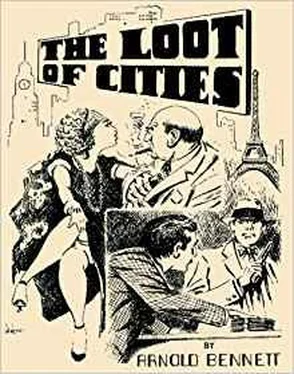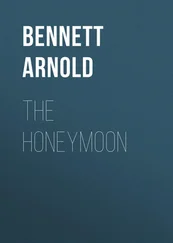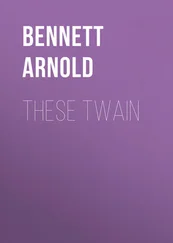"So it's blackmail," said Mr. Bowring, grim.
The dark eyes opposite to him sparkled gaily.
"It desolates me," the youngish man observed, "to have to commit you to the deep with only ten thousand. But, really, not less than fifty thousand will requite me for the brain-tissue which I have expended in the study of your interesting situation."
Mr. Bowring consulted his watch.
"Come, now," he said, huskily; "I'll give you ten thousand. I flatter myself I can look facts in the face, and so I'll give you ten thousand."
"My friend," answered the spider, "you are a judge of character. Do you honestly think I don't mean precisely what I say — to sixpence? It is eight-thirty. You are, if I may be allowed the remark, running it rather fine."
"And suppose I refuse to part?" said Mr. Bowring, after reflection. "What then?"
"I have confessed to you that I hate violence. You would therefore leave this room unmolested, but you wouldn't step off the island."
Mr. Bowring scanned the agreeable features of the stranger. Then, while the lifts were ascending and descending, and the wine was sparkling, and the jewels flashing, and the gold chinking, and the pretty women being pretty, in all the four quarters of the Devonshire, Mr. Bruce Bowring in the silent parlour counted out fifty notes on to the table. After all, it was a fortune, that little pile of white on the crimson polished wood.
"Bon voyage!" said the stranger. "Don't imagine that I am not full of sympathy for you. I am. You have only been unfortunate. Bon voyage!"
"No! By Heaven!" Mr. Bowring almost shouted, rushing back from the door, and drawing a revolver from his hip pocket. "It's too much! I didn't mean to — but confound it! what's a revolver for?"
The youngish man jumped up quickly and put his hands on the notes.
"Violence is always foolish, Mr. Bowring," he murmured.
"Will you give them up, or won't you?"
"I won't."
The stranger's fine eyes seemed to glint with joy in the drama.
"Then ——"
The revolver was raised, but in the same instant a tiny hand snatched it from the hand of Mr. Bowring, who turned and beheld by his side a woman. The huge screen sank slowly and noiselessly to the floor in the surprising manner peculiar to screens that have been overset.
Mr. Bowring cursed. "An accomplice! I might have guessed!" he grumbled in final disgust.
He ran to the door, unlocked it, and was no more seen.
IV. The lady was aged twenty-seven or so; of medium height, and slim, with a plain, very intelligent and expressive face, lighted by courageous, grey eyes and crowned with loose, abundant, fluffy hair. Perhaps it was the fluffy hair, perhaps it was the mouth that twitched as she dropped the revolver — who can say? — but the whole atmosphere of the rose-lit chamber was suddenly changed. The incalculable had invaded it.
"You seem surprised, Miss Fincastle," said the possessor of the bank-notes, laughing gaily.
"Surprised!" echoed the lady, controlling that mouth. "My dear Mr. Thorold, when, strictly as a journalist, I accepted your invitation, I did not anticipate this sequel; fþrankly I did not."
She tried to speak coldly and evenly, on the assumption that a journalist has no sex during business hours. But just then she happened to be neither less nor more a woman than a woman always is.
"If I have had the misfortune to annoy you ——!" Thorold threw up his arms in gallant despair.
"Annoy is not the word," said Miss Fincastle, nervously smiling. "May I sit down? Thanks. Let us recount. You arrive in England, from somewhere, as the son and heir of the late Ahasuerus Thorold, the New York operator, who died worth six million dollars. It becomes known that while in Algiers in the spring you stayed at the Hôtel St. James, famous as the scene of what is called the 'Algiers Mystery,' familiar to English newspaper-readers since last April. The editor of my journal therefore instructs me to obtain an interview with you. I do so. The first thing I discover is that, though an American, you have no American accent. You explain this by saying that since infancy you have always lived in Europe with your mother."
"But surely you do not doubt that I am Cecil Thorold!" said the man. Their faces were approximate over the table.
"Of course not. I merely recount. To continue. I interview you as to the Algerian mystery, and get some new items concerning it. Then you regale me with tea and your opinions, and my questions grow more personal. So it comes about that, strictly on behalf of my paper, I inquire what your recreations are. And suddenly you answer: 'Ah! My recreations! Come to dinner to-night, quite informally, and I will show you how I amuse myself!' I come. I dine. I am stuck behind that screen and told to listen. And — and — the millionaire proves to be nothing but a blackmailer."
"You must understand, my dear lady ——"
"I understand everything, Mr. Thorold, except your object in admitting me to the scene."
"A whim!" cried Thorold vivaciously, "a freak of mine! Possibly due to the eternal and universal desire of man to show off before woman!"
The journalist tried to smile, but something in her face caused Thorold to run to a chiffonier.
"Drink this," he said, returning with a glass.
"I need nothing." The voice was a whisper.
"Oblige me."
Miss Fincastle drank and coughed.
"Why did you do it?" she asked sadly, looking at the notes.
"You don't mean to say," Thorold burst out, "that you are feeling sorry for Mr. Bruce Bowring? He has merely parted with what he stole. And the people from whom he stole, stole. All the activities which centre about the Stock Exchange are simply various manifestations of one primeval instinct. Suppose I had not — had not interfered. No one would have been a penny the better off except Mr. Bruce Bowring. Whereas ——"
"You intend to restore this money to the Consolidated?" said Miss Fincastle eagerly.
"Not quite! The Consolidated doesn't deserve it. You must not regard its shareholders as a set of innocent shorn lambs. They knew the game. They went in for what they could get. Besides, how could I restore the money without giving myself away? I want the money myself."
"But you are a millionaire."
"It is precisely because I am a millionaire that I want more. All millionaires are like that."
"I am sorry to find you a thief, Mr. Thorold."
"A thief! No. I am only direct, I only avoid the middleman. At dinner, Miss Fincastle, you displayed somewhat advanced views about property, marriage, and the aristocracy of brains. You said that labels were for the stupid majority, and that the wise minority examined the ideas behind the labels. You label me a thief, but examine the idea, and you will perceive that you might as well call yourself a thief. Your newspaper every day suppresses the truth about the City, and it does so in order to live. In other words, it touches the pitch, it participates in the game. To-day it has a fifty-line advertisement of a false balance-sheet of the Consolidated, at two shillings a line. That five pounds, part of the loot of a great city, will help to pay for your account of our interview this afternoon."
"Our interview to-night," Miss Fincastle corrected him stiffly, "and all that I have seen and heard."
At these words she stood up, and as Cecil Thorold gazed at her his face changed.
"I shall begin to wish," he said slowly, " that I had deprived myself of the pleasure of your company this evening."
"You might have been a dead man had you done so," Miss Fincastle retorted, and observing his blank countenance she touched the revolver. "Have you forgotten already?" she asked tartly.
"Of course it wasn't loaded," he remarked. "Of course I had seen to that earlier in the day. I am not such a bungler ——"
Читать дальше












